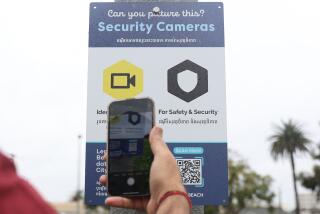Houston Bridges ‘Digital Divide’
- Share via
In a fresh assault on bridging the gap between the haves and have-nots of the Internet revolution, Houston launched an innovative program Monday providing each of its 1.8 million residents with free e-mail accounts and access to word processing software.
The multimillion-dollar effort is the first attempt by a major U.S. city to create a public utility for computing. Dubbed SimHouston, the program recognizes that the Internet is as important in the 21st century as roads and bridges were in centuries past.
“We think this is just another service the city government should provide, like water and public works,” said Denny Piper, the city’s chief information officer.
With SimHouston, residents can create personal accounts that can be accessed via any computer connected to the Internet. In addition to e-mail and word processing, the accounts will enable residents to create spreadsheets, keep track of their calendars, create electronic presentations and even conduct videoconferences when those additional features are brought online in the coming weeks. Some of those programs can cost hundreds of dollars each.
Some Internet users at the Houston Library’s downtown branch were skeptical that SimHouston would lure more residents online.
Robert Shea said the free e-mail accounts were “kind of pointless” because so many Web sites, such as Yahoo and Hotmail, already offer them. The 33-year-old part-time security guard said he probably would check out the service anyway, just out of curiosity.
Mayor Lee P. Brown pointed to SimHouston’s first user, who Monday accessed the word processor to create and print out a resume.
“Every person in Houston can now have access to their own computer desktop,” Brown said. “This brings Houston into the future today.”
What SimHouston doesn’t provide--at least not yet--is additional computers from which residents can access the Net and the documents they store in their accounts.
But simply deploying personal computers in schools, libraries and other public places isn’t enough to bridge the so-called “digital divide,” said Robert Knowling, chief executive of Internet Access Technologies, the company that built the software for SimHouston.
“The digital divide is not about access. It’s about information and contact and being able to use the Internet so it enhances your life and improves the educational process.”
Houston’s public libraries already have installed 470 computers with Internet access in their 37 branches around the city, and many of them end up sitting idle. Rather than invest additional money in computer hardware--especially in a city where 60% of households already boast their own Internet connections--the city decided to spend money on software that would make the existing PCs more useful, said Piper, the city’s information officer.
Dexter Taylor, 30, an unemployed security guard who used an Internet terminal Monday in the Houston Library’s downtown branch to play a game of online chess, said he welcomed the new initiative.
“Everything free, I want,” he said with a grin. “I mostly use the computer to play games and check e-mail, but I see no reason to turn down other free things.”
Piper initially considered the Internet Access Technologies software, called SimDesk, for government employees. “Then I got to thinking: ‘Why wouldn’t it work for 2 million people?’ ”
By converting the city’s 14,000 PCs to the new system, Piper estimates Houston will save as much as $10 million a year on information technology costs. Some of the savings will be used to help fund SimHouston, which will cost several million dollars for the first three years.
Because Houston already has provided more Internet terminals than residents can use, “it makes perfect sense to increase the capabilities of the machines that they’ve got,” said Mark Lloyd, executive director of the Civil Rights Forum on Communications Policy in Washington.
But most cities still are trying to cope with the demand for Internet access in their libraries, said John W. Berry, president of the American Library Assn. in Chicago.
In the Flushing branch of the New York Public Library, for example, residents line up outside before it opens at 10 a.m. to sign up for a half-hour slot on one of the Internet terminals. By 11 a.m., all the day’s slots are filled.
But other cities are thinking about joining Houston by offering their own versions of SimDesk, including Chicago and Indianapolis. Internet Access Technologies’ Knowling said he expects to sign up a second city within 45 days.
In Houston, city officials are planning to launch a marketing campaign to make residents aware that Internet access and other software are available for free at the library. Some librarians also are being trained on the SimHouston system so they can answer questions from users, Piper said.
“The problem we’re going to have is people standing in line wanting to use it,” he said. “I think that’s a good problem to have.”
*
Times researcher Lianne Hart in Houston contributed to this story.







